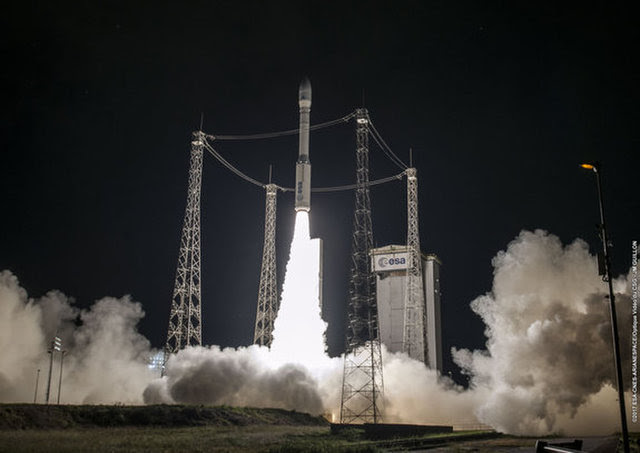Space.com
By Caleb Henry, SpaceNews
Arianespace completed the company’s tenth launch this year Nov. 7, delivering a Moroccan Earth observation satellite to low-Earth orbit on a Vega rocket.
The mission, Arianespace’s penultimate for the year, marks the 11th consecutive success for the Avio-supplied Vega, a light-lift rocket that has picked up a regular cadence now within the Arianespace family of rockets.
Vega took off at 8:42 p.m. Eastern from the European spaceport in Kourou, French Guiana with Morocco’s Mohammed 6-A satellite. The rocket’s three solid stages — all with engines from Rome-based Avio — performed as planned, followed by two successful burns of the Attitude and Vernier Upper Module liquid engine from Ukrainian supplier Yuzhnoye.
The nighttime launch is the third Vega mission of 2017, following the August dual launch of Optsat-3000 for the Italian Ministry of Defense and the Israeli-French Venµs science mission, and the March launch of the European Commission’s Sentinel-2B.
Arianespace has nine more Vega missions already sold. In September the company purchased six more Vegas from Avio, along with four of the next generation Vega C, for which a first launch is planned in 2019.
Mohammed 6-A is the first of two Earth observation satellites in a Moroccan constellation, and is designed for both environmental monitoring applications and border surveillance. Thales Alenia Space built the satellite’s payload, while co-prime Airbus Defence and Space supplied the Astrobus platform and integration services.
The satellite has a mass of 1,110 kilograms. Both companies contributed to Mohammed 6-A’s ground segment, and are also building the second Moroccan Earth-observation satellite.
Arianespace’s final mission of the year is a Dec. 12 Ariane 5 launch carrying four Galileo European navigation satellites. The European launch provider originally had 12 missions slated for this year, but dropped one Ariane 5 after delays with Yahsat’s Al Yah 3 and Avanti’s Hylas-4 pushed both satellites out to 2018.
This story was provided by SpaceNews,







